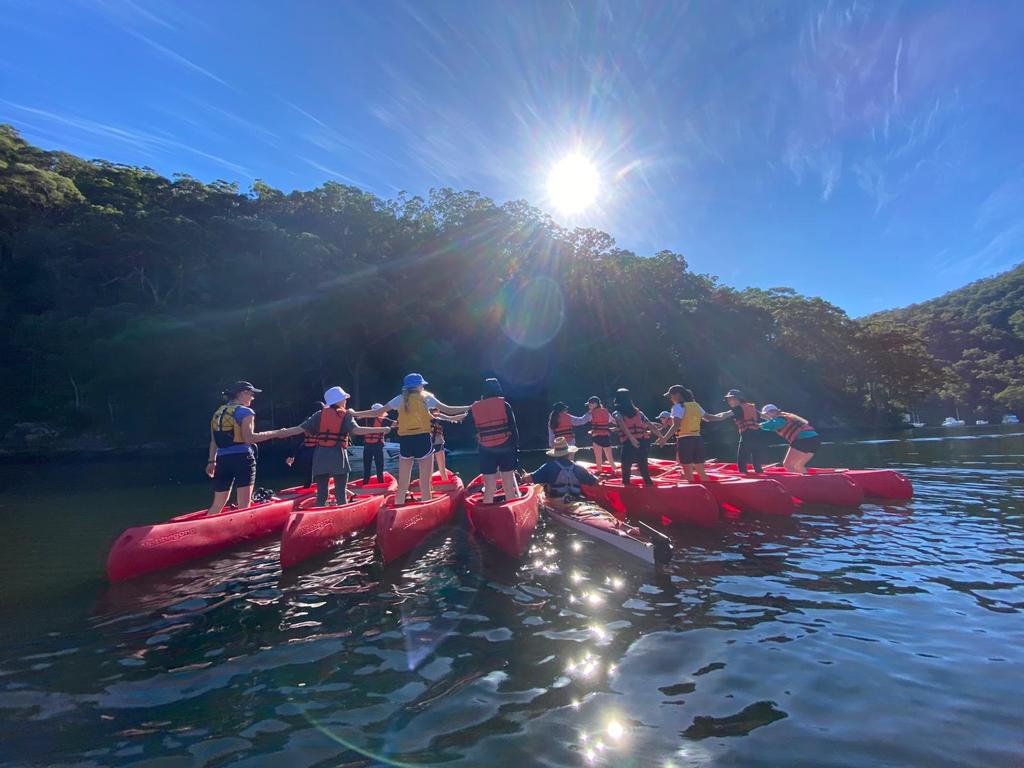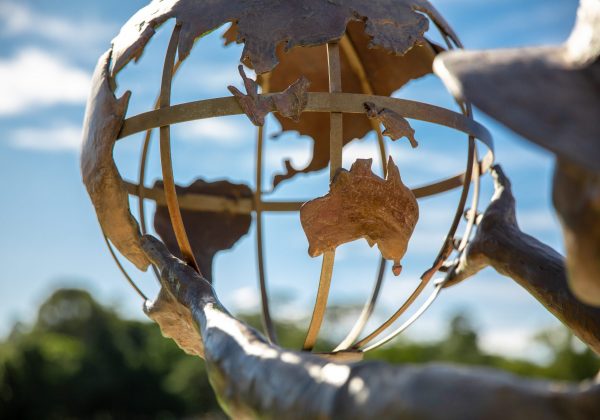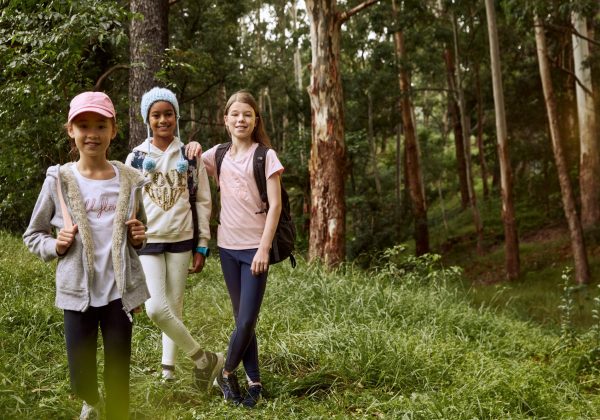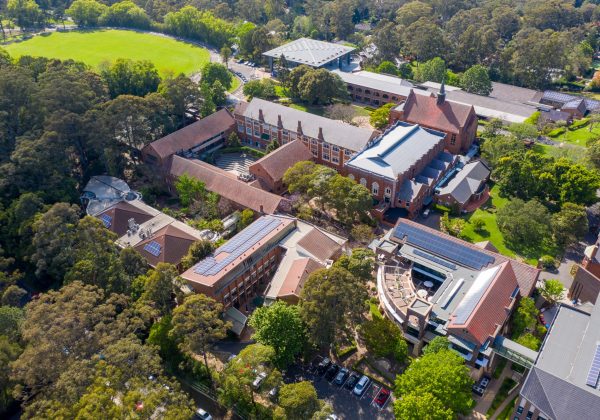Outdoor Education
The vision for Outdoor Education at Pymble is courageous and impactful, and centred around providing rewarding Experiential Learning experiences for all students.
Experiential Learning is defined as, “challenge and experience followed by reflection, leading to learning and growth.”
Experiential Learning through outdoor adventure and journey-based learning is a powerful medium that we are setting out to harness for the benefit of our students and ultimately, for society. The goal is to create a genuine, sequential and outcomes-based outdoor learning continuum across our Kindergarten to Year 12 school.
The Pymble Outdoor Education Continuum is a life-changing journey that empowers girls to be courageous and to approach new challenges with optimism and excitement.
The key focus areas of the Continuum include personal growth, connection to peers, life skills, leadership, rites of passage and environmental stewardship.
In each year of their schooling, students will participate in a progressive program designed to develop their physical, emotional and social resilience, whilst strengthening their connection to the natural environment.
Our Pymble Outdoor Educators create and facilitate concrete experiences for students that challenge them to communicate and collaborate with others.
Students problem-solve, achieve goals, face fears and anxieties, and challenge preconceived notions of themselves and the world.
We know that when individuals are pushed out of their comfort zone, the greatest educational gains can take place and the outdoor environment is a perfect vehicle for this outcome. Ultimately these experiences not only build character and important life skills, but they are enjoyable for all and result in lifelong memories.
Nature Play in the Junior School
In Kindergarten, Year 1 and Year 2, students are encouraged to explore their environment through a series of nature immersion experiences. Activities range from nature walks and bush art to obstacle courses, team building activities and camp fire experiences. The aim of these sessions is to get students more in touch with their natural surroundings and more comfortable outside, allowing them to be creative and discover new things.
‘Children learn through play and there is no better resource than nature’
The benefits of students interacting with their environment in this way are profound.
Research has shown that nature play can lead to improved classroom behaviour, motivation and enthusiasm to learn, as well as better quality sleep at night. It also nurtures creativity, curiosity, and stronger social connections.
In Years 2 and 3, our girls experience their first overnight experience with a program of team building, nature activities and unstructured play that extends across the Pymble and Vision Valley campuses. Time in a different environment enables them to learn new things about themselves and the outdoors and prepares them for longer and more adventurous experiences to come in their Pymble years.
In Year 4, students set off on a two-night adventure, staying at Vision Valley for their first evening, before venturing further afield to explore the beautiful wilderness on Vision Valley’s front doorstep. Students will take to the bush and rivers for some fun and more challenging outdoor activities and games and enjoy another evening camping and exploring a new location. The focus of this program is on connections to peers, staff and nature, pushing comfort zones and developing expedition skills.
In Year 5, the girls revisit the Vision Valley campus for a three-day camping experience. Here, they will be involved in some more adventurous outdoor activities as a step up from previous years, alongside team building and environmental activities. These experiences will help them learn new skills and find pursuits they enjoy, building confidence in their own abilities and being away from home.
Our Year 6 girls are extended further, in preparation for their transition to Secondary School. They will experience another new wilderness location for a four-day adventure, enjoying some peak experiences to sign off their Junior years at Pymble. Activities will be more challenging and varied, including abseiling, kayaking and horse riding. Students will also camp out each night, practicing their skills and helping to prepare food, whilst creating special memories with their peers.
These graduated Junior School experiences will allow our students to take on more adventurous opportunities in their Secondary years with confidence and resilience, having become more comfortable staying out overnight and with the courage to visit new locations and navigate greater physical and personal challenges.

Year 7
As students start their Secondary School journey, the dual focus of the Outdoor Education program in Year 7 is to create experiences that foster peer connection and build courage and self-belief, and to arm students with expedition style skills that will prepare them for longer journeys in the outdoors in future years. Based out of Vision Valley, students will hike and paddle through some amazing locations in the national parks surrounding Vision Valley over a five-day program. They will also enjoy other exciting team activities and the chance to top off each day camping under the stars.
Year 8
‘Challenge by Choice’ is the focus of the Year 8 Outdoor Education program. Students are given options for their program with different locations and activities to suit their appetite for adventure and challenge. They can choose to spend five days on a coastal adventure, camping and enjoying activities such as surfing, stand-up paddle boarding, mountain biking, coastal walks, bush regeneration and indigenous immersion. Alternately, students can opt for an expedition-style camping program on the Colo River, bushwalking, canoeing and climbing their way through this beautiful region whilst challenging themselves on mud runs, obstacle courses and team initiatives.
Year 9
In line with Pymble’s goal to establish a flagship, long-stay residential program, 2022 will see a pilot program run for select Year 9 students at the Vision Valley campus, progressing to a term-long program in future years. This program will involve both academic studies and the chance for experiential learning and personal development through regular and progressive outdoor education journeys. These journeys will involve hiking, paddling and biking through various locations, leading to a final expedition home to Pymble Ladies’ College.
The long-stay program offers a carefully curated range of challenges and experiences and the chance to develop and learn in a unique environment. The impact of such extended experiences is profound and transformative on students at this age. They become more aware of their individual strengths and abilities, more mindful of each other and their surroundings and they develop great resilience and a strong appreciation of the natural environment.
Year 10
In Year 10, students are once again invited to choose their level of challenge and adventure with a choice between two amazing experiences: a five-day coastal adventure in Murramarang National Park or the nine-day ‘Namadji’ hiking expedition within Alpine National Park.
Murramarang provides a stunning backdrop for students on the coastal adventure as they stay at a different campsite each evening and explore the coastline by bushwalking, kayaking, snorkelling, stand-up paddle boarding and surfing, and also taking part in an indigenous immersion experience.
The Namadji program challenges those students who wish to extend themselves and test their expedition skills, providing a once in a lifetime opportunity to complete a multi-day hiking journey across Australia’s highest mountain range, taking in the views from Mt Bogong, the highest mountain peak in Victoria.
Extension Opportunities in the Pymble Outdoor Education program include The Duke of Edinburgh’s Award and the Australian Army Cadets.
A vision for experiential outdoor learning
All year groups will have opportunities to experience a range of formative Outdoor Education programs during their time at Pymble.
You can read more about the important role our Outdoor Education campus plays in our vision for girls in this article written by our Director of Research and Development, Dr Sarah Loch, and our Director of Vision Valley, Mr Stuart Clark, published in AHISA’s Independence magazine.


